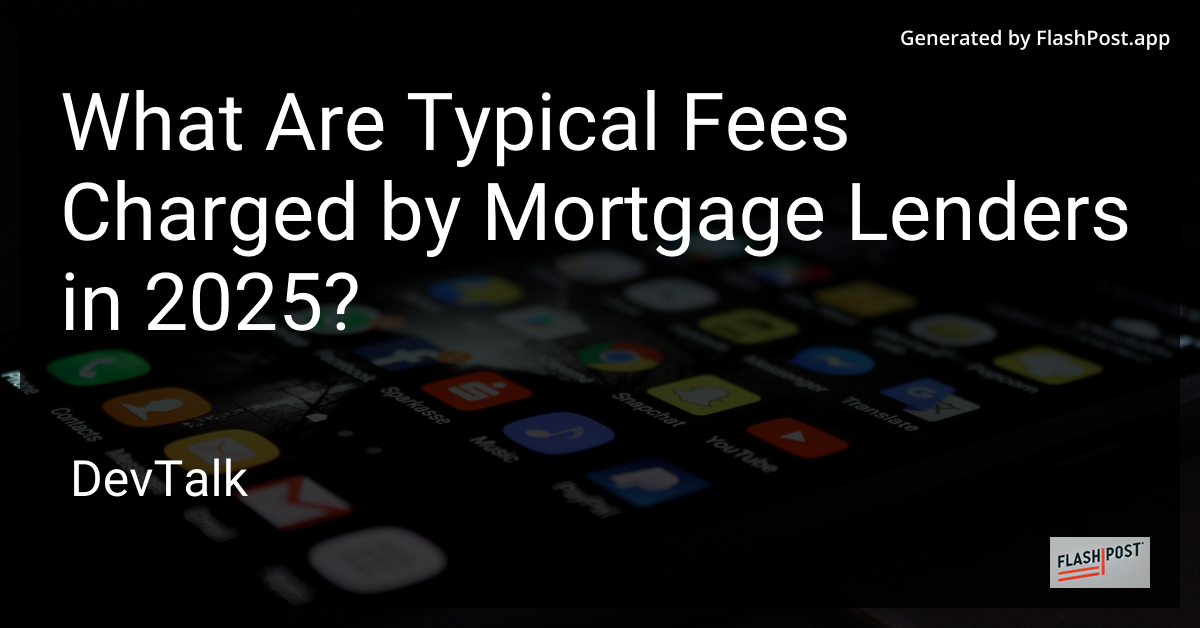What Are Typical Fees Charged by Mortgage Lenders in 2025?
 # Typical Fees Charged by Mortgage Lenders in 2025
# Typical Fees Charged by Mortgage Lenders in 2025
Navigating the world of mortgages can be daunting, especially when it comes to understanding the various fees involved.
Whether you're a first-time homebuyer or refinancing, knowing the typical fees charged by mortgage lenders in 2025 can help you plan effectively and avoid surprises at closing. In this article, we'll break down the common charges you might encounter during the mortgage process.
1. Loan Origination Fee
The loan origination fee is a standard charge that covers the lender's cost to process and set up your mortgage. In 2025, this fee typically ranges from 0.5% to 1% of the loan amount. For a $300,000 mortgage, expect to pay between $1,500 and $3,000. It's crucial to compare origination fees from different lenders, as they can sometimes be negotiable.
2. Appraisal Fee
An appraisal is necessary to determine the property's fair market value. Mortgage lenders require this to ensure they are not over-lending. Appraisal fees in 2025 generally range from $300 to $600, depending on the property's size and location.
3. Credit Report Fee
Lenders will review your credit history to assess your financial reliability. The credit report fee typically costs between $25 to $50. This fee covers the expense of obtaining your credit report from the major credit bureaus.
4. Title Search and Title Insurance
Title search and title insurance fees protect both you and the lender from potential disputes about property ownership. In 2025, a title search fee might cost between $200 and $400, while title insurance could range from $500 to $1,000 based on your home's value and location.
5. Underwriting Fee
The underwriting fee is charged to cover the lender's costs of evaluating your mortgage application and verifying the information provided. This fee usually ranges from $400 to $900 in 2025.
6. Private Mortgage Insurance (PMI)
If your down payment is less than 20% of the home's purchase price, private mortgage insurance (PMI) is typically required. PMI rates vary, but on average, homeowners might pay between 0.3% and 1.5% of the original loan amount per year.
7. Recording Fees
Local government agencies charge recording fees to officially document the mortgage transaction. These fees can vary widely but typically range from $50 to $200 based on your property's location.
8. Additional Considerations in 2025
- Discount Points: Consider purchasing discount points if you plan to lower your mortgage interest rates. Each point costs 1% of the loan amount and can reduce your rate by up to 0.25%.
- Prepayment Penalties: These fees are less common now, but be sure to confirm whether your mortgage carries any penalties for early payoff.
For a more comprehensive understanding of mortgages, including the mortgage grace period, check out related resources. If you're considering a larger loan, learn about jumbo mortgages in 2025 and their unique requirements. For those new to the mortgage process, this guide on understanding mortgages can offer valuable insights.
Conclusion
Understanding the fees associated with obtaining a mortgage in 2025 is crucial for effective financial planning. Always review each fee carefully, compare offers from multiple lenders, and consult with a financial advisor to ensure you’re making the best decision for your situation. By staying informed, you can navigate the mortgage process with confidence and secure the best possible deal for your new home or refinance.
This article provides an overview of common mortgage fees and is intended for informational purposes only. Always consult a licensed mortgage professional for personalized advice.